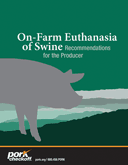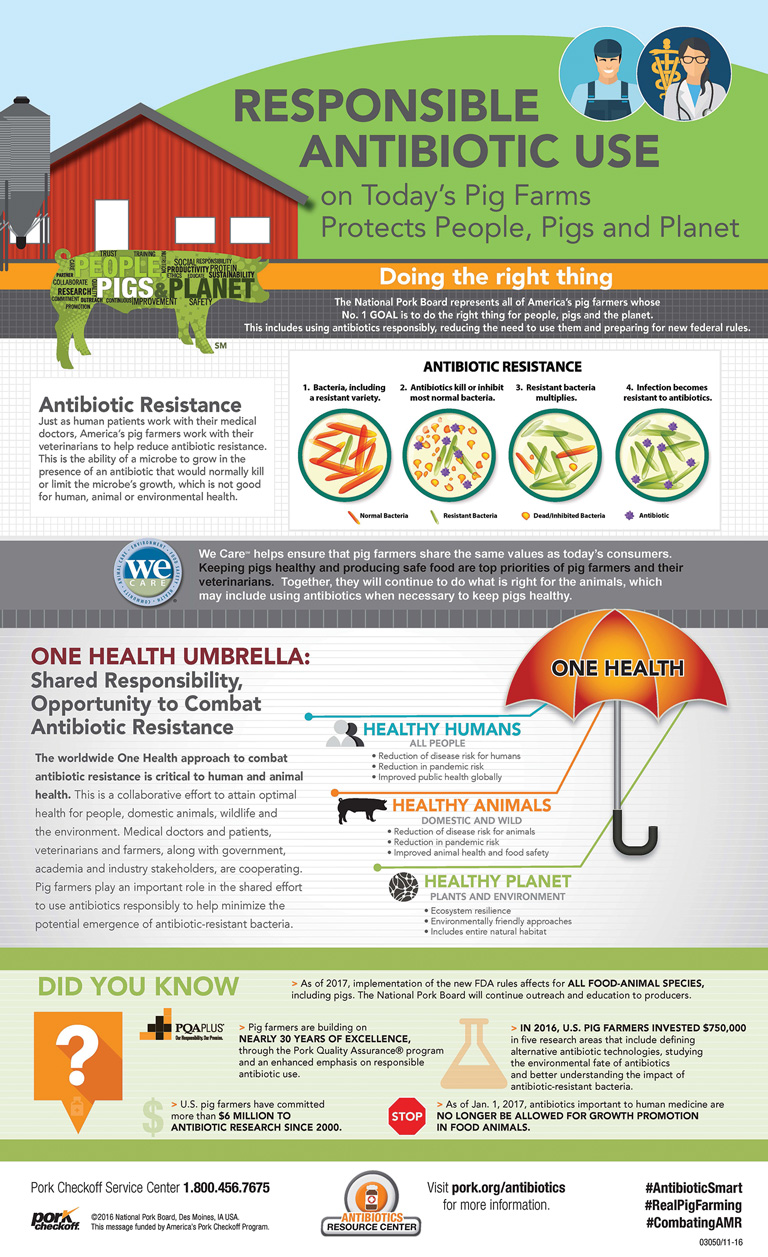News from the National Pork Board (Jan ’17)
 Checkoff unveils updated on-farm euthanasia guide
Checkoff unveils updated on-farm euthanasia guideThe newly revised On-Farm Euthanasia of Swine Recommendations for the Producer (English and Spanish), produced by the Pork Checkoff and the American Association of Swine Veterinarians, is now available in both print and electronic versions. According to Sherrie Webb, Checkoff’s director for animal welfare, the changes to the guide were made in light of new research data on various euthanasia methods, many of which were found through Pork Checkoff-funded work. These changes, along with field experience with the current commercially available equipment, allowed for fine tuning of the recommendations. Webb says notable changes include electrocution, which is now acceptable for pigs older than 3 days of age, and the non-penetrating captive bolt, which is now acceptable as a single-step method for pigs up to 70 pounds, if the appropriate force is achieved. The timely euthanasia definition also was updated to be consistent with the Common Swine Industry Audit. Additional updates were made to streamline the guide to make it easier to read.
To get printed or electronic copies, go to pork.org and click on the Pork Store button on the homepage. For more information, contact Sherrie Webb at SWebb@pork.org or 515-223-3533.
Pork Checkoff offers public-focused infographic on responsible antibiotic use
To help tell the real story of how today’s pork producers are working with their veterinarians to do the right thing as it relates to antibiotic use, the National Pork Board has created an infographic to share with the public. It debuted during CDC’s “Get Smart About Antibiotics Week” last November and is available as a poster or PDF via pork.org and the Checkoff’s Pork Store site at no charge.
For more information, contact Mike King, director of science communications, at mking@pork.org or 515-223-3532.
US pig farmers celebrate progress on antibiotic stewardship
The National Pork Board recently celebrated the US Centers for Disease Control and Prevention’s (CDC’s) annual celebration, “Get Smart About Antibiotics Week,” by highlighting recent activities related to using antibiotics wisely to safeguard the health and well-being of people, animals, and the environment.
“The ‘Get Smart About Antibiotics Week’ is a good time to reflect on our long history of accomplishments in the antibiotics area, such as using these medications responsibly and embracing the updated Pork Quality Assurance Plus certification program,” said National Pork Board President Jan Archer, a pig farmer from North Carolina. “As pig farmers, we are aware of the challenge of antibiotic resistance and are dedicated to working hard to preserve the effectiveness of antibiotics, both on the farm and in human medicine.”
The National Pork Board’s three-point antibiotic stewardship plan, announced in mid-2015, focuses on promoting research, increasing pig-farmer education and communicating with consumers in 2016 and beyond. The Antibiotic Resource Center, found at www.pork.org/antibiotics, is an example of efforts to assist farmers and others who want to learn more about responsible on-farm antibiotic use.
In another demonstration of its commitment to the complex issue of antibiotic resistance, the National Pork Board hosted a national dialogue earlier this year called “Resistance: The Antibiotic Challenge.” The Washington, DC, event brought together key opinion leaders from human health, animal health, government, pharmaceutical, and retail and consumer segments to discuss the challenge of responsible antibiotic use in the 21st century. Another joint dialog occurred earlier this month in Denver when the National Pork Board and the American Public Health Association discussed the shared responsibility of reducing the need for antibiotics.
Financially, the farmer-led board has invested more than $6 million in Pork Checkoff funds in antibiotic-related research since 2000, with $750,000 spent this year alone in five research priority areas specifically aimed at reducing antibiotic resistance and finding antibiotic alternatives.
“Real change is underway on pig farms across America, with farmers and their veterinarians shaping the discussion around responsible antibiotic use,” Archer said. “As the Food and Drug Administration prepares to implement the new, more stringent rules, such as the upcoming ban on using medically important antibiotics for growth promotion in food animals, we’ll be ready.”
For more information, contact Mike King, director of science communications, at mking@pork.org or 515-223-3532.
Swine science online now available
You may have heard about the US Pork Center of Excellence’s Swine Science Online program, but now there’s an easy way for you to explain it to others – simply go to “TheUSPorkCenter” page on YouTube to view an overview of what the Swine Science Online program has to offer. Its purpose is to make sure students who are interested in the swine industry know about this opportunity so that it will expand their educational options and help improve the pork industry for the future. Swine Science Online is the perfect option for students looking to enhance their education or for pig farmers looking for specialization. It is 17 individual courses, with industry-leading instructors available to students across the county, no matter their current university or college.
For more information, contact Chelsey Van Genderen at cvangenderen@usporkcenter.org or 515-223-2641.
